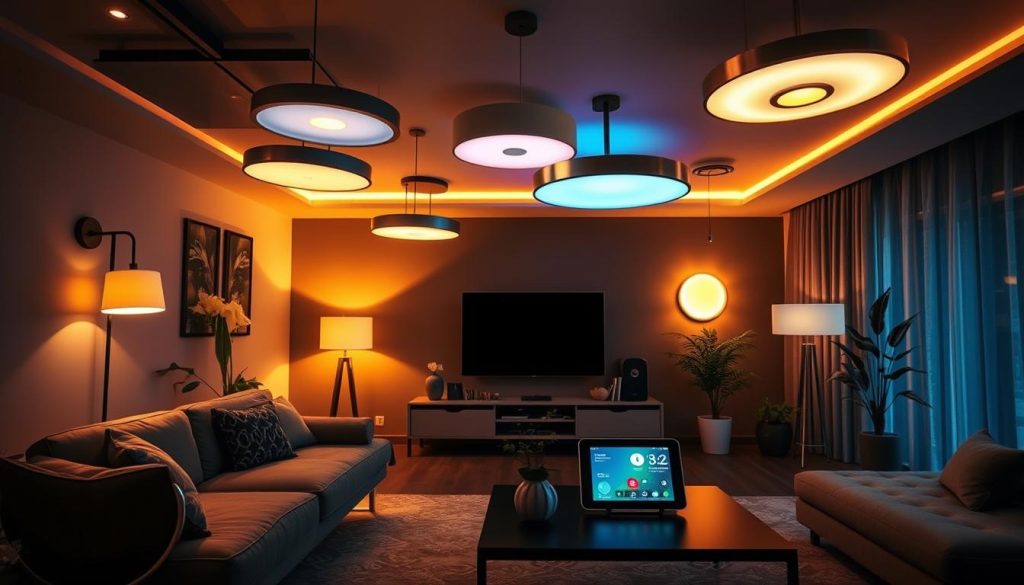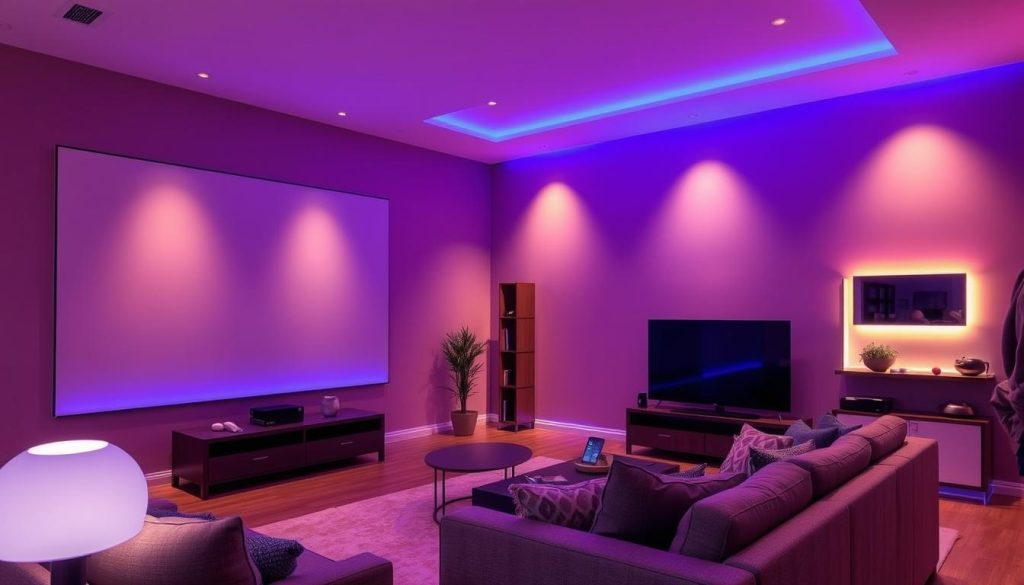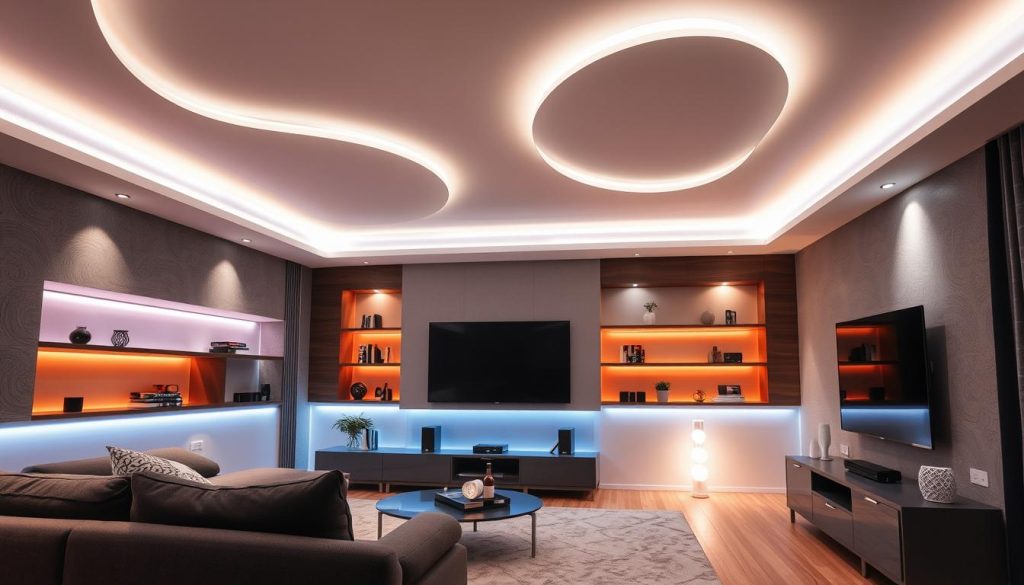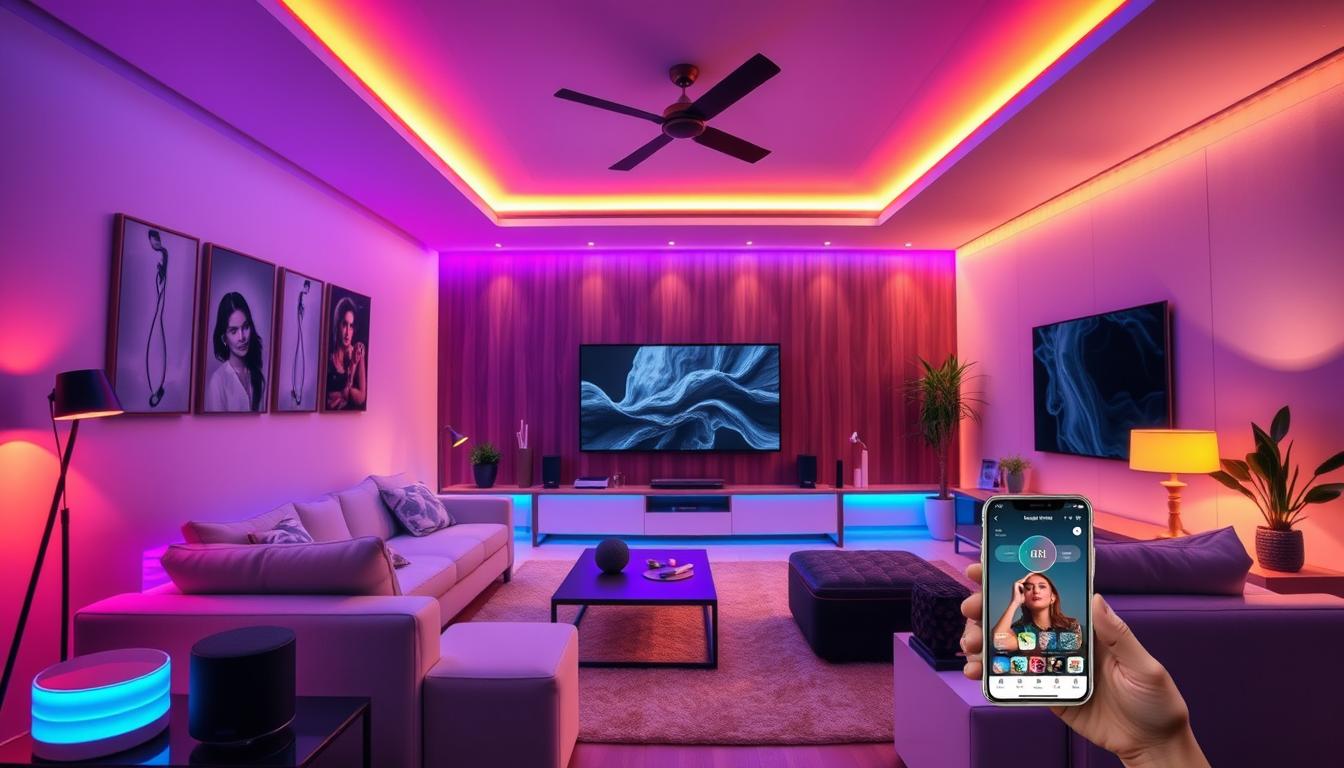I’m excited to share the benefits of smart lighting. It can make your home brighter, smarter, and more convenient. With fast advancements in smart home tech, upgrading to smart lighting is easier than ever.
Smart Lighting is key to a smart home. It saves energy, boosts security, and adds convenience. Adding smart lighting makes your home more comfortable and enjoyable.
I’ll show you how to upgrade your home with smart lighting. This makes controlling and automating your lights simple. Whether you want to save energy or make life easier, smart lighting is the answer.
What is Smart Lighting?
Exploring smart home tech, I’m excited about smart lighting. It’s about lighting systems you can control and automate. This can be done through apps, voice assistants, or sensors. It’s great for saving energy and cutting down on bills.
Smart lighting often uses LED lights. These lights last longer and use less energy. Plus, you can change the lighting levels and colors easily. This lets you create a mood that fits your day.
Defining Smart Lighting Features
Smart lighting has some cool features:
- Remote control through apps or voice assistants
- Scheduling and automating lighting scenes
- Tracking energy use and reporting
- Changing colors and adjusting brightness
How Smart Lighting Works
Smart lighting systems have a hub that connects to your network. This lets you control your lights from anywhere. The lights use wireless tech like Zigbee or Bluetooth to get commands.
Using smart lighting in my home means I get lots of benefits. I save energy, enjoy easy control, and create a personalized atmosphere. It’s all about convenience and making my space feel just right.
Benefits of Smart Lighting in My Home
Upgrading my home with smart lighting is exciting. I look forward to the many benefits it brings. Smart bulbs and connected lighting mean more energy efficiency, convenience, and control over my lights. I can automate my lighting and integrate it with other smart devices, making my life easier and more comfortable.
Some key advantages of smart lighting include:
- Energy efficiency: Smart bulbs use less energy and can be programmed to turn off when not in use, reducing my energy consumption and saving me money.
- Convenience: With connected lighting, I can control my lights from anywhere, using my smartphone or voice assistant, making it easy to adjust the lighting to suit my needs.
- Home security: Smart lighting can also enhance my home’s security by allowing me to schedule lights to turn on and off, making it look like someone is home even when I’m away.

Investing in smart lighting brings these benefits and more. It makes my home more comfortable, convenient, and secure. With lighting automation, I can take my smart home to the next level. I’m excited to explore the possibilities.
| Smart Lighting Benefits | Description |
|---|---|
| Energy Efficiency | Reduced energy consumption and lower energy bills |
| Convenience | Control lights from anywhere using smartphone or voice assistant |
| Home Security | Schedule lights to turn on and off to deter intruders |
Types of Smart Lighting Solutions
Smart lighting comes in many forms, each with its own benefits. I’m looking into different smart lighting options for my home. This includes smart bulbs, smart fixtures, and outdoor lighting. I want to find out which one fits my smart home needs best.
Smart Bulbs vs. Smart Fixtures
Choosing between smart bulbs and smart fixtures is a big decision. Smart bulbs are easy to install and work with many smart home systems. They also come in a variety of colors.
On the other hand, smart fixtures offer a more complete lighting solution. They often have built-in sensors and can save energy.

Color-Changing LED Lights and Smart Outdoor Lighting Options
Color-changing LED lights and smart outdoor lighting are also worth considering. They add convenience and security to my home. With smart outdoor lighting, I can control lights remotely and schedule them to turn on and off.
| Smart Lighting Solution | Features | Benefits |
|---|---|---|
| Smart Bulbs | Color options, scheduling, energy monitoring | Easy to install, compatible with smart home systems |
| Smart Fixtures | Seamless lighting integration, built-in sensors, energy efficiency | Provides a comprehensive lighting solution, often more energy-efficient |
| Color-Changing LED Lights | Color options, scheduling, mood lighting | Adds ambiance and convenience to my home automation system |
| Smart Outdoor Lighting | Scheduling, remote control, security features | Enhances home security, provides convenience and peace of mind |
Getting Started with Smart Lighting
To start my smart lighting journey, I first need to figure out what my home needs. I look at energy efficiency, convenience, and if they work with my other smart devices. I aim to make my home bright, welcoming, and easy to control.
Assessing My Home’s Needs
When I think about my home’s needs, I consider a few things:
- Room size and layout
- Lighting needs (like task and ambient lighting)
- How much energy I want to save
- If they work with my other smart devices
By looking at these points, I can pick the best smart lighting for my home.
Choosing the Right Smart Lighting Products
Choosing the right smart lighting can be tough with so many options. I focus on energy-saving LED lights that fit with my smart home. Popular choices include smart bulbs, fixtures, and hubs. Picking the right ones lets me create a system that meets my needs.

| Smart Lighting Product | Energy Efficiency | Compatibility |
|---|---|---|
| Smart Bulbs | High | Wide range of devices |
| Smart Fixtures | Medium | Specific devices only |
| Smart Lighting Hubs | High | Multiple devices |
Installation Tips for Smart Lighting
Installing smart lighting systems requires safety and sometimes professional help. I’ve learned that a good installation is key to enjoying smart bulbs. Always follow the manufacturer’s instructions and take precautions to avoid hazards.
Some important steps for a safe installation include:
- Turning off the power to the lighting circuit before starting the installation
- Using the correct tools and equipment to avoid damaging the smart bulbs or other components
- Following the manufacturer’s guidelines for wiring and connectivity
If DIY installation feels daunting, getting professional help is a good choice. A licensed electrician can install the system correctly and safely. This ensures peace of mind and avoids potential issues. With careful planning and execution, homeowners can enjoy the benefits of smart lighting, improving their home’s ambiance and security.
Integrating Smart Lighting into My Smart Home
I’m excited to learn about smart lighting for my home. It lets me control my lights easily. This makes my home more comfortable and saves energy.
Compatibility with Smart Home Systems
Many smart lights work with systems like Samsung SmartThings and Apple HomeKit. This means I can use voice commands or apps to change the lights. Some lights even work with Zigbee and Z-Wave, making them easy to add to my smart home.
Using Voice Assistants to Control Lighting
I can use Amazon Alexa or Google Assistant to control my lights. Saying “Hey Alexa, turn on the living room lights” lights up the room. This hands-free control is great for when I’m busy.
Smart lighting makes my home more efficient, convenient, and cozy. I can use voice commands or apps to control my lights. This way, I can always make my living space comfortable.

Customizing My Smart Lighting Experience
To get the most out of my smart lighting system, I want to make it fit my lifestyle and preferences. Smart lighting lets me create a personalized experience that makes my home more inviting and functional. It also helps me save energy and cut down on costs by using energy-efficient and LED lighting solutions.
Customizing my smart lighting involves setting up schedules and routines. This lets me automate my lighting to turn on and off at certain times. It’s convenient and helps me save energy. For example, I can set my lights to turn off when I leave and on when I come back.
This feature works great with smart home systems and voice assistants. It makes controlling my lighting easy with just my voice.
Setting Up Schedules and Routines
- Automate lighting to turn on and off at specific times
- Set up routines for different occasions, such as movie nights or dinner parties
- Use voice assistants to control lighting with ease
I can also create mood lighting for various occasions. Adjusting the color temperature and brightness of my LED lighting solutions does this. For example, I can make my home warm and cozy for dinner or bright and energizing for a workout.
By customizing my smart lighting, I make my home more comfortable and enjoyable. It becomes a place where I can relax and have fun.
Troubleshooting Common Smart Lighting Issues
Exploring smart bulbs and connected lighting, I’ve hit some common snags. One big issue is when bulbs won’t connect. I check the manual and make sure everything is set up right.
App problems are another headache. I restart the app or update it to the newest version. Still stuck? I contact the maker’s support team for help.
Common Troubleshooting Steps
- Check the power supply to ensure that all smart bulbs are turned on
- Restart the smart lighting hub or bridge to resolve connectivity issues
- Update the smart lighting app to the latest version
- Reset smart bulbs to their factory settings if necessary
By taking these steps, I can fix common smart lighting problems fast. This keeps my connected lighting and automation running well.
With a bit of patience and some troubleshooting, I get to enjoy smart bulbs’ perks. These include saving energy, being more convenient, and boosting home security.
Future Trends in Smart Lighting Technology
Looking ahead, I’m thrilled about the smart lighting innovations coming our way. The smart lighting world is always changing, with new tech that will transform how we light our homes. We’ll see more seamless and efficient lighting thanks to smart home tech, home automation, and lighting integration.
Artificial intelligence and the Internet of Things (IoT) are key trends. They promise to make lighting more personal and adaptable. For instance, smart lights can adjust based on our routines or the weather outside. This will make our lives simpler, save energy, and cut down on costs.
Innovations on the Horizon
- Advanced LED lighting with improved color rendering and energy efficiency
- Smart lighting systems that integrate with other smart home devices and systems
- Voice-controlled lighting systems that use natural language processing
Sustainability will be crucial in future smart lighting tech. With growing worries about climate change and energy use, smart lighting must be eco-friendly. By using smart home tech, home automation, and lighting integration, we can make our homes greener and more sustainable.
Sustainability and Smart Lighting
I’m excited about the future of smart lighting and its impact on our lives. With smart home tech, home automation, and lighting integration, we’re heading towards a more sustainable, efficient, and convenient future. From advanced LED lights to voice-controlled systems, the future of smart lighting is promising and full of possibilities.
Smart Lighting and Home Value
Thinking about adding smart lighting to my home makes me curious about its impact on value. Smart lighting can boost my home’s look and save energy. It also makes my home more welcoming to potential buyers.
Increasing Curb Appeal
A smart lighting system can make my home look better from the outside. Energy-efficient outdoor lights can show off my home’s best parts. They create a cozy feel that makes my home stand out.
Here are some ways to boost curb appeal with smart lighting:
- Installing solar-powered lights to illuminate walkways and gardens
- Using color-changing LED lights to create a unique and inviting exterior design
- Adding motion-sensing lights to enhance home security and energy efficiency
Attracting Potential Buyers
Smart lighting is also key when I sell my home. It shows off the home’s smart features, making it appealing to tech-savvy buyers. Here are some ways to attract buyers with smart lighting:
| Smart Lighting Feature | Benefit to Buyers |
|---|---|
| Energy-efficient lighting | Reduced energy costs and environmental impact |
| Customizable lighting scenes | Enhanced ambiance and mood control |
| Smart home integration | Seamless control and automation of lighting and other smart devices |
Personalizing My Smart Lighting Preferences
Smart lighting lets me make it my own. I can name my
smart bulbs
and rooms. I also create special
lighting automation
scenes. It’s all about making it personal.
Naming My Lights and Rooms
I can rename my smart lights and assign them to rooms in the app. This makes controlling them easy. I can use voice commands or tap icons to manage them.
Naming them helps me stay organized. For example, I call the living room lamp “Living Room Lamp.” It’s simple.
Creating Custom Scenes and Settings
I can set up special lighting scenes for different times. For a cozy evening, I dim the lights. For a morning boost, I brighten them up.
With a few taps, I change the mood of any room. It’s amazing.
Customizing my smart lighting makes my home feel special. It’s tailored to my life and needs. By personalizing my
connected lighting
, I get more out of my smart home.


